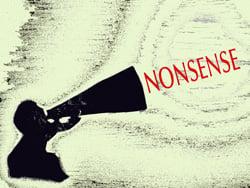Yeh Woh - The News on Sunday 21st July
By Masud Alam
By Masud Alam
He goes by the name Shahid Khursheed Kunwar, he has access to internet and a set of 260 email addresses of media houses and their editors and journalists he regularly writes to, and he loves tormenting popular newspaper columnists with his corrigenda and terse comments on their writings, on a daily basis.
Little else is known about him and he makes an effort to add mystery to his virtual persona by not answering emails. It’s as if he has a one-way email account — it can only send, not receive any mail. But he is a terror for all the newspaper lions who roar on anyone from presidents and opposition leaders to chiefs of army and judiciary. And he terrorises by showing them their mistakes, factual mistakes that cannot be argued for, and that only make ‘senior journalists and analysts’ squirm at their own complaisance, or at the laziness of their interns who do their research, for giving Kunwar ammunition to attack back with.
Some of the mistakes he points out can be simple typos, or misspelled words. Majority of the errors he picks up on have to do with general knowledge and poetry. (That makes me think he could be a student preparing for CSS exam or a retired civil servant). ‘You mentioned in the opening para and then repeated in line seven: such and such in the state of Orlando. There is no such state in the USA. I pay my homage to your knowledge’. Another unfortunate writer who said something about Ka’aba being ‘lakhs of miles away’ was made to regret his careless choice of words. Catch the delight in Kunwar’s response: “Doctor sahib, perhaps you are a bit short on common sense because no point on earth is more than 12, 000 miles from Qibla. Don’t try to be so poignant (sic) and emotional at this age.”
Sometimes he gets really nasty in his comments, like, “I want to laugh at your compact knowledge. In 1840 total American states were 26 and not 28”. Or, “Maulana how could a deceased of 12th century be sophisticated and stylish in the 13th century? Alas, Sultan Salahuddin Ayubi died in 1193 AD. It is your 1357th blunder”. Or to the horror of this writer who uses the titles of doctor and allama with his byline, and who had dared to call for a change in Muslims’ ‘ausaf’ using the word for ‘qualities’ rather than good qualities: “You did not uphold carefulness and alertness while translating this aayat of Sura Ra’ad. Ausaf means plus points and saintliness in one’s nature and are not required to be changed. Hence your doctori and allamai are doubtful. Kindly be careful in future”.
He reserves his absolute wrath for those who misquote poetry; the bigger the wronged poet the more poison Kunwar injects into his response. So when a top columnist used one extra word in a couplet by Ghalib, he was livid: “Professor sahib it is incorrect, reprehensible and shameful mistake on your part. Mirza Nausha will never forgive you. ‘Khoob’ is unnecessarily added. I don’t understand the reason or logic behind your stupid invention”.
I have a feeling Kunwar keeps journalists in general and columnists in particular, in very low esteem. He probably figured early on that his avid reading, his ability to find errors in text, and his research to correct them may not impress his audience, indeed they may not even get the point he is making. So he puts the point in the subject line of his emails. Like, “Illiterate writers must be condemned”, “An Urdu writer must write at least correct Urdu” and the gleeful counter challenge, “Now where do you stand?”
You’d think in a journalistic environment where no one from writer to sub-editor to editor has the time or resources or an inclination to check and double check their facts, Kunwar’s self-assumed and diligently performed duty will have earned him at least writers’ gratitude — if they wish to have a personal credibility regardless of the publication’s reputation — despite his occasional meanness. I assure you this is not the case. I have never seen a ‘thank you’ note in response to Kunwar’s group mails.
What I have seen is one email in recent months, from one of the group recipients whom I don’t know, addressed to Kunwar and solely discussing various possibilities, some wild other unmentionable, of Kunwar’s paternity.
Good news for the writers of this and other English-language newspapers is, Kunwar’s attention is focused exclusively on Urdu publications. We are free to make mistakes … until the English version of Kunwar shows up among the readers and starts embarrassing us.
